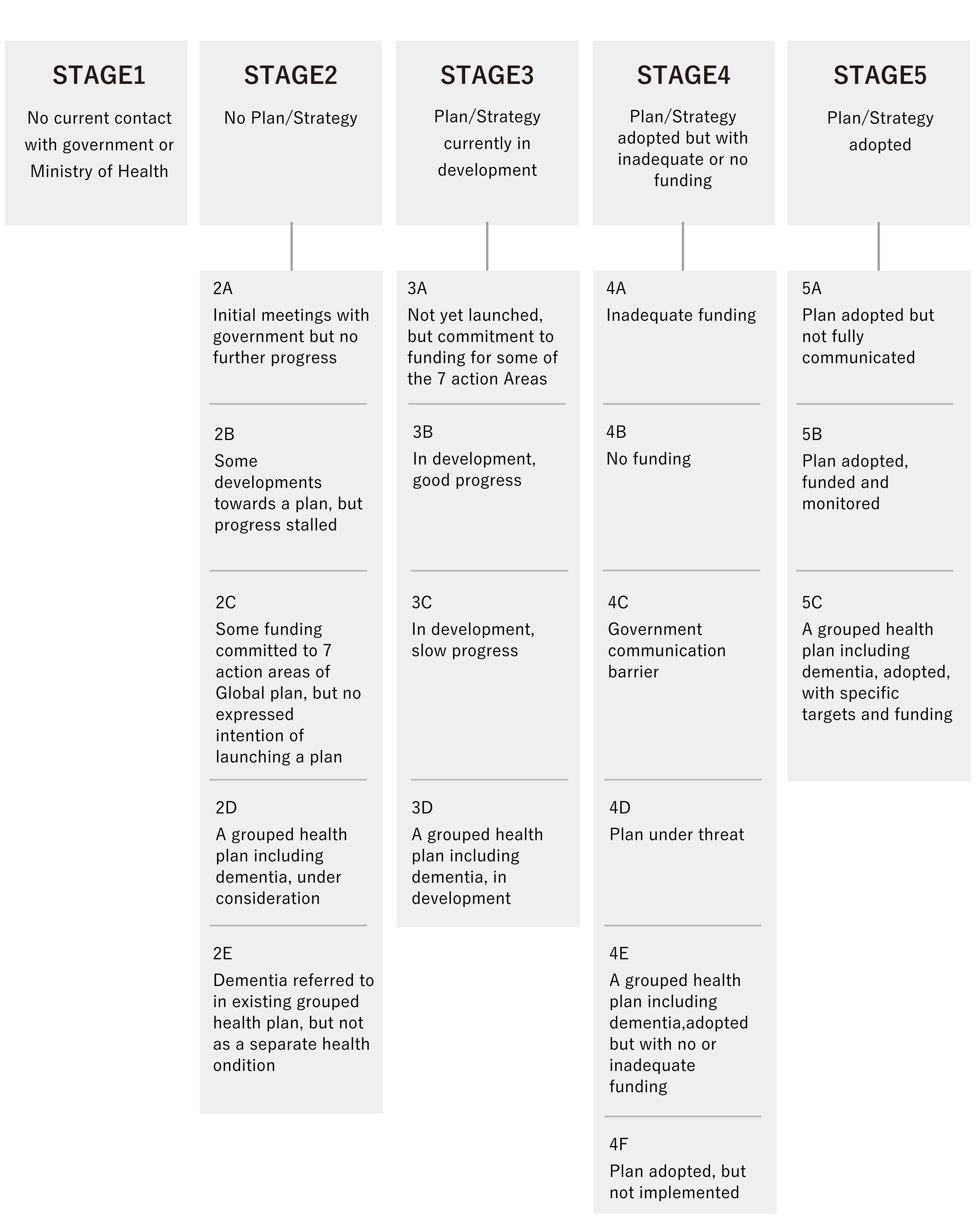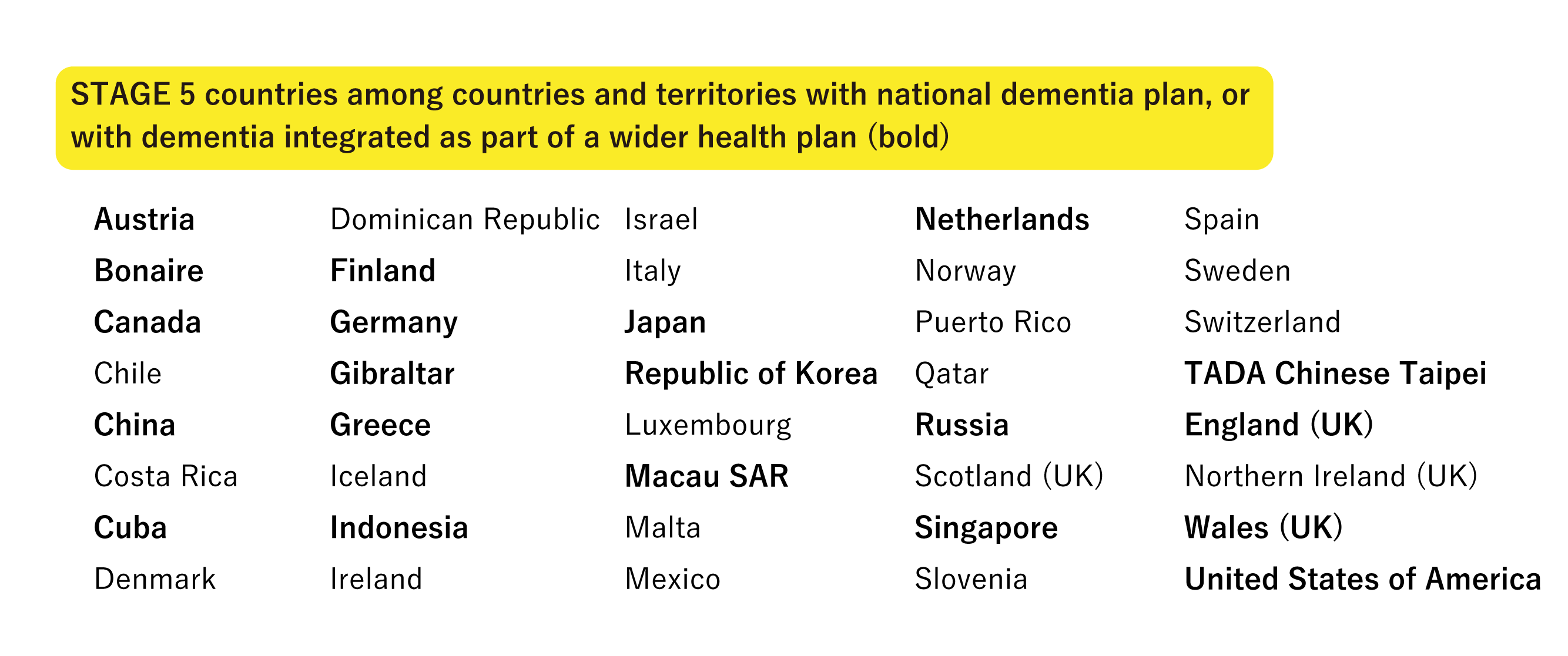[HGPI Policy Column] No. 30 – From the Dementia Policy Team – The Position of Dementia Policy in International Society in 2022
date : 9/7/2022
Tags: Dementia, HGPI Policy Column
![[HGPI Policy Column] No. 30 – From the Dementia Policy Team – The Position of Dementia Policy in International Society in 2022](https://hgpi.org/en/wp-content/uploads/sites/2/column-30-top.jpg)
<POINTS>
- On May 26, 2022, Alzheimer’s Disease International (ADI) presented a report assessing dementia policies in each country titled, “From Plan to Impact V – WHO Global action plan: The time to act is now.”
- Only 48 countries and territories have formulated national plans for dementia, 39 of which are Member States of the World Health Organization (WHO). To meet the WHO’s goal of having 75% of Member States develop national dementia plans by 2025, 35 Member States must adopt dementia plans every year for the next three years. The situation is extremely difficult.
- ADI’s annual report summarizing progress on the formulation of policies for dementia is extremely valuable. Japan must actively contribute to such efforts to share information in international society.
From Plan to Impact V
In this column, we will introduce and discuss “From Plan to Impact V – WHO Global action plan: The time to act is now,” which was released by Alzheimer’s Disease International (ADI) on May 25, 2022. Below, we will refer to it as the ADI 2022 Report.
This series of annual reports from ADI summarizes progress on the adoption of national strategies for dementia in each country and territory while sharing examples of such strategies, making it a precious resource for tracking developments in global dementia policy. This will be our third column reviewing an ADI report, following our previous columns covering the 2020 and 2021 versions.
The Position of Dementia Policy in International Society (July 2020)
The Position of Dementia Policy in International Society 2021 (June 2021)
Meeting WHO targets for 2025 has become extremely difficult
This year’s survey found that as of May 2022, 48 countries and territories have completed and adopted national strategies for dementia. Among them, 39 are Member States of the WHO. (In 2021, 40 countries and territories had completed national strategies, 32 of whom were WHO Member States. In 2020, these figures were 31 and 27, respectively.)
One target set by “Global action plan on the public health response to dementia 2017-2025” presented by WHO in 2017 (hereinafter, “the WHO Action Plan”) reads, “75% of [WHO Member States] will have developed or updated national policies, strategies, plans or frameworks for dementia, either stand-alone or integrated into other policies/plans, by 2025.” Meeting this target by 2025 will require 35 additional countries and territories to formulate national plans every year for the next three years, leaving us to conclude that the situation is exceedingly difficult.
The ADI 2022 Report also had some updates to the indicators used in the assessment. A new stage called “4F: Plan adopted, but not implemented” was added. While this is only conjecture, it may have been the case that the impact of the COVID-19 pandemic over several years made it impossible to allocate personnel for implementing national plans, even after those plans had been adopted.
Just like in 2021, Japan was ranked “5B: Plan adopted, funded, and monitored.” The report also touches on the effects of COVID-19 on people living with dementia in Japan, pointing out that the number of care beds where they can be treated for COVID-19 infections is limited, and that the availability of medical home visits has not kept up with demand.
In Figure 3, among countries and territories that have already adopted national dementia plans, those that meet the criteria for “STAGE 5” described above are shown in bold. Three countries have moved up this year: Austria, the Netherlands, and Finland. It is wonderful to see that policy progress was made even while the world was responding to the COVID-19 pandemic.
The ADI 2022 Report also shares a number of examples from various countries, which include several severe situations in low- and middle-income countries. According to the report, approximately 60% of people living with dementia are in low- and middle-income countries where personnel and financial resources continue to be split for conducting vaccination programs and taking other measures for infection control.
We must also mention Ukraine, which is currently engulfed in war. The report notes that Ukraine was in the process of developing a national plan for dementia, but that the situation has changed drastically due to the Russian invasion.
Conclusion
Continuing from our columns last year and the year before, this column took a look at the content of ADI’s report. This annual update on progress in developing national plans for dementia around the world is extremely valuable and I would like to once again express our gratitude and respect to ADI and everyone involved in preparing it.
To make it easier to prepare such reports, it is also very important that Japan communicates relevant information to the international community. As pointed out in previous columns, although domestic dementia policy includes precise goals and progress is being carefully managed, communication has been insufficient. Another issue moving forward is the fact that there is also almost no communication in languages other than Japanese. From this perspective, I believe that the Japan International Dementia Exchange Platform can play a key role. It is operated mainly by Alzheimer’s Association Japan, the Japanese branch of ADI. As a member of their steering committee, this may sound like singing our own praises, but from the perspective of information objectivity, I think it is significant that a civil society organization with branches throughout Japan like Alzheimer’s Association Japan is taking responsibility for international communication. While its main function is currently to disseminate information in Japanese and English using the platform website, in the future, it can provide opportunities for mutual exchange, serve as a link between stakeholders in the field of dementia including civil society, academia, and industry, and be a source of information on the progress of these activities for the global community.
Next year, Japan will host the G7 Summit. We will also mark one decade since the 2013 G8 Dementia Summit in the U.K. In July 2022, Health and Global Policy Institute (HGPI) presented policy recommendations titled, “The Future of Dementia Policy 2022,” which calls for the adoption of dementia as a central agenda at the G7 Summit. We have high expectations for Japan to provide leadership that reminds the global community of the importance of dementia and reinvigorates efforts to promote dementia policy after a few years of slow progress for its agenda. HGPI and the Designing for Dementia Hub will also continue working in their capacity as civil society organizations to help build that momentum.
Column author
- Shunichiro Kurita (Manager, HGPI; Steering Committee Member, Designing for Dementia Hub)
- Hiroko Makino (Associate, HGPI)
< HGPI Policy Column (No.31) -From the Planetary Health Policy Team-
HGPI Policy Column (No.29) -From the Planetary Health Policy Team- >
Top Research & Recommendations Posts
- [Research Report] Perceptions, Knowledge, Actions and Perspectives of Healthcare Organizations in Japan in Relation to Climate Change and Health: A Cross-Sectional Study (November 13, 2025)
- [Policy Recommendations] Mental Health Project: Recommendations on Three Issues in the Area of Mental Health (July 4, 2025)
- [Research Report] The 2025 Public Opinion Survey on Healthcare in Japan (March 17, 2025)
- [Research Report] The 2023 Public Opinion Survey on Satisfaction in Healthcare in Japan and Healthcare Applications of Generative AI (January 11, 2024)
- [Policy Recommendations] Developing a National Health and Climate Strategy for Japan (June 26, 2024)
- [Policy Recommendations] Recommendations on Strategic Investments in Policies for Brain Health to Revitalize Japan: Hopes for the New Administration (December 1, 2025)
- [Policy Recommendations] Reshaping Japan’s Immunization Policy for Life Course Coverage and Vaccine Equity: Challenges and Prospects for an Era of Prevention and Health Promotion (April 25, 2025)
- [Announcement] HGPI Endorses the “Belém Health Action Plan” (November 14, 2025)
- [Announcement] HGPI Joins Global Green and Healthy Hospitals (August 1, 2023)
- [Research Report] AMR Policy Update #2: WHO’s First Report on Fungal Infection—Bridging the Gap Between Clinical Practice and R&D
Featured Posts
-
2025-12-09
[Event Report] Special Seminar “Rising to New Challenges in Health Sciences for Future Society: Novel Developments in the Field of Epilepsy in Japan and Globally” Belgium Pavilion Special Seminar, World Expo 2025 Osaka, Kansai (September 18, 2025)
![[Event Report] Special Seminar “Rising to New Challenges in Health Sciences for Future Society: Novel Developments in the Field of Epilepsy in Japan and Globally” Belgium Pavilion Special Seminar, World Expo 2025 Osaka, Kansai (September 18, 2025)](https://hgpi.org/en/wp-content/uploads/sites/2/HGPI_20250805_mental-health-expo-eyechatch.png)
-
2025-12-11
[Event Report] Core Components of Universal Health Coverage (UHC): Achieving “Healthcare Without Financial Hardship” in Asia-Pacific and Japan (December 5, 2025)
![[Event Report] Core Components of Universal Health Coverage (UHC): Achieving “Healthcare Without Financial Hardship” in Asia-Pacific and Japan (December 5, 2025)](https://hgpi.org/en/wp-content/uploads/sites/2/HGPI_20251210_Core-Components-of-Universal-Health-CoverageUHC-top.jpg)
-
2025-12-12
[Registration Open] Meaningful Involvement Promotion Project Urgent Symposium “The New Takaichi Administration and Central Social Insurance Medical Council Reform – Ensuring Patients’ Voices are Heard” (January 22, 2026)
![[Registration Open] Meaningful Involvement Promotion Project Urgent Symposium “The New Takaichi Administration and Central Social Insurance Medical Council Reform – Ensuring Patients’ Voices are Heard” (January 22, 2026)](https://hgpi.org/en/wp-content/uploads/sites/2/HGPI_20251208_urgent-symposium-1.png)
-
2025-12-12
[Registration Open] (Webinar) The 140th HGPI Seminar “Early Detection to Reduce COPD Disease Burden: Connecting Clinical Frontiers with Health Policy” (January 27, 2026)
![[Registration Open] (Webinar) The 140th HGPI Seminar “Early Detection to Reduce COPD Disease Burden: Connecting Clinical Frontiers with Health Policy” (January 27, 2026)](https://hgpi.org/en/wp-content/uploads/sites/2/hs140-top.png)
-
2025-12-16
[Discussion Points] Policy Dialogue “Considering Comprehensive Genomic Profiling from the Perspective of Patient Access: Utilizing the Medical Service Fee Reimbursement System and the Mixed Medical Services Program to Meet the Needs of Today” (November 28, 2025)
![[Discussion Points] Policy Dialogue “Considering Comprehensive Genomic Profiling from the Perspective of Patient Access: Utilizing the Medical Service Fee Reimbursement System and the Mixed Medical Services Program to Meet the Needs of Today” (November 28, 2025)](https://hgpi.org/en/wp-content/uploads/sites/2/eyecatch_Policy-Dialogue_Discussion-Points_20251128.jpg)







